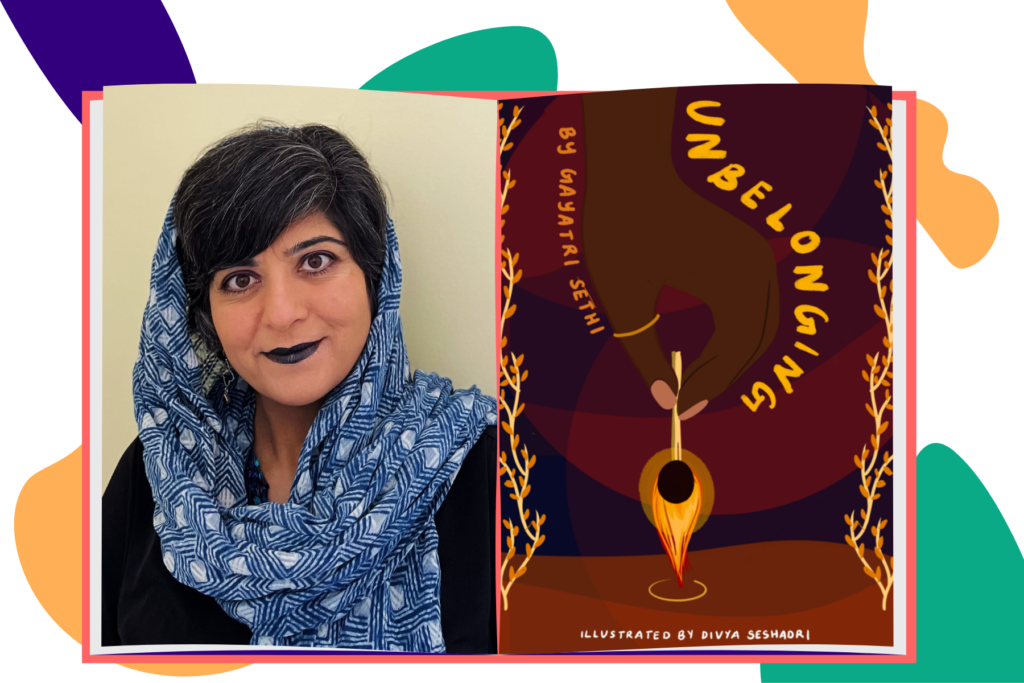
I write this book review from the Western Ghats of Maharashtra in an ashram of sorts run mostly by Germans. (LOL!) What better a place to unbelong to? A week into my experience here, despite the healing I’m receiving, I find myself feeling suffocated from inescapable whiteness, colorism, and heteronormativity wafting through the air.
Per usual, my books are my escape — “Unbelonging” being one of them. Had “Unbelonging” been the only book I had brought with me, I would’ve been in trouble. But because it is part of a carefully curated constellation of books I intentionally packed, it perfectly balances out the stack.
“Unbelonging” is an important text published in 2021 that weighs deeply on the psyche. It needs to be paced out at a speed comfortable to you, the reader. Since it is meant to affect and inform your perspective, the manner in which you go through this book is of the essence. There isn’t a lot of joy in the book, but that is also clearly not its objective.
[Read Related: Book Review: Two Times Removed: An Anthology of Indo-Caribbean Fiction]
Gayatri Sethi, also endearingly known as Desi Book Aunty on the socials, hand-gifted me this book in Decatur (“where it’s greater” but not really) this past October. I was in ATL to celebrate a heterosexual, white wedding (of a couple I didn’t know; I was a +1) but was able to escape to a literary event for one of the days. This is where I met Sethi IRL for the first time and she so lovingly provided me with a signed copy.
Love is at the core of “Unbelonging,” but love is a complicated thing in a world where people don’t know how to practice it. “Unbelonging” delves into the –isms that chip away at love and mutate into thorny things like silence, fear, shame, pain. All of these painful shards have created feelings of unbelonging in Sethi. This book is about Sethi reclaiming not her belonging—but rather, her unbelonging—that she evidently chooses to lean into. The pain you can imagine that comes with her process of finding comfort in being broken away, tells you everything you need to know about why this book is void of joy.
View this post on Instagram
I’m a sucker for memoirs, so naturally, my favorite parts of “Unbelonging” were the passages where Gayatri gets personal and narrates about her life, upbringing, and intimate details related to her family. While that’s clearly not the objective of this text, had it been, I personally would’ve found it easier to journey through because I connect through personal narrative. The majority of the text consists of melancholic musings with a significant didactic value that comes in the form of the free-verse.
Reading the free-verse in “Unbelonging” was difficult for me because when I read poetry, I expect there to be beauty. Then again, beauty is subjective. For me, the poetry in “Unbelonging” felt overtly poignant—almost too thorny to touch. The messaging was direct and not flowery. Grasping too many sharp poems at the same time can easily slice. That’s how reading it felt—at times—until I slowed down and went at my own pace; a pace comfortable for me while mixing in a variety of other literature.
[Read Related: Book Review: Batambuze Debuts Book on ‘Blindian’ Love in ‘When We See Ourselves’]
It was then that I was able to appreciate “Unbelonging” more. The book is divided into three parts and has interactive elements that encourage the reader to self-reflect on big questions related to un/belonging. The first part, titled “Desi-ish,” delves into Sethi’s trialed relationship to South Asia and South Asians. The second part is “African-ish” and explores the wounds related to Sethi’s continent of birth. The third section is “American-ish” and tugs at Sethi’s existence in a country that fundamentally should not even exist.
While love is at the core of “Unbelonging,” critiquing anti-Black racism is at the root of that core. Sethi said what needed to be said. We cannot know true love until we dismantle this hate. Sethi drives that point home through her poems that impress on us how we should carry ourselves through the world with more integrity.
Integrity is a great thing, which is why this book is of importance. The objective might not be achieved if you read it on its own because your headspace and heart space may feel bombarded.
View this post on Instagram
When “Unbelonging” got too emotionally challenging to read, I would close it and return to my breath. Then, I would remember pain is everywhere, but so is ecstasy, and so is love, and so is rage. If I needed to cry, I cried. I would think back to all my painful experiences and feel gratitude that I’m still able to read and write despite all the nay-sayers and dignity-shamers. I would think about my community—those I surround myself with—and remember that I’m loved and supported in my own journey. And then I’d remind myself of my limitless capacity to love—this is key.
Sethi’s main takeaway is that you get to choose what you belong to, and what you unbelong to. These choices are likely connected to your core wounds, but there is beauty and power in exercising your agency. The takeaway: Self-care yourself up and down while reading Sethi’s text.
You can keep up with Gayatri Sethi’s work here and buy a copy of “Unbelonging” from Mango & Marigold Press!




